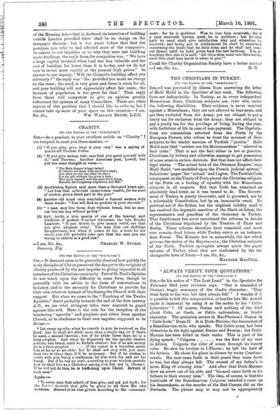rTO THE EDITOR OF THE "SPECTATOR:1 SI11,—It does not seem
to be generally observed how quickly the
early disciples of Christ perceived the danger to the recipient of charity produced by the new impulse to giving imparted to all members of the Christian community. Few of St. Paul's Epistles do not touch upon the difficulty in some form, though he generally veils his advice in the form of exhortations to industry, and to the necessity for Christians to provide for their own relatives instead of burdening the Church with their support. But when we come to the "Teaching of the Twelve Apostles," dated probably towards the end of the first century A.D., we see what stringent rules were required to guard against this eviL Here is the rule for the reception of the wandering " apostles " and prophets sent either from another Church, or in obedience to their own impulse, supposed to be divine :--
" Let every apostle, when be cometh to you, be received as the Lord but he shall not abide more than a single day, or if there be need, a second likewise ; but if he abide three days, he is a false prophet. And when he departeth let the apostle receive nothing but bread, until he findeth shelter; but if he ask money he is a false prophet If the comer is a traveller, assist him so far as ye are able : but he shall not stay with you more than two or three days, if it be necessary. But if he wishes to settle with you, being a craftsman, let him work for and eat his bread. But if he has no craft, according to your wisdom provide how he shall live as a Christian among yon, but not in idleness. If he will not do this, he is trafficking upon Christ. Beware of such men."
Again — "To every man that asketh of thee give, and ask not back; for the Father desireth that gifts be given to all from His own bounties. Blessed is he that giveth according to the command- meat : for he is guiltless. Woe to him that receiveth: for if a man receiveth having need, he is guiltless ; but he that bath no need shall give satisfaction why and wherefore he received ; and being put in confinement he shall be examined concerning the deeds that he bath done, and he shall not come out thence until he hath given back the last farthing. Yea, as touching this also it is said: 'Let thine alms sweat into thins hands, until thou shaft have /carat to whoni to give."
Could the Charity Organisation Society have a better motto?






































 Previous page
Previous page